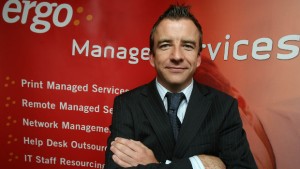Boiling down costs
According to Martin Deignan, director of sales and marketing, OKI Systems, many new technologies have appeared in the last few years that have resulted in increased print efficiencies but really what it still boils down to is cost.
“Taking costs out of a company will always be in fashion. A lot has happened in recent years in managed print services using developments in technology to take cost out of print because of the constraints on resources that companies have had to put up with from the recession. But where we’re going is towards a more document-centric view of how companies manage this aspect of their costs.”
The future of the industry will be found, in Deignan’s opinion, in managed document services and not just in print.
“Managed document solutions will change this industry. This is inseparable from print given the technology out there, and just as print is a function that is easily boxed off, by extension document management can be something similar.”
“There are more efficiencies waiting to be achieved in terms of how document-centric services are delivered to the customer, and also in terms of the types of hardware development that’s going on,” he said.
“It’s not simply about ‘speed and feed’, it’s about stuff like enabling open platforms to allow different document solutions to work together. It’s about being able to offer more sophisticated security and at a lower cost.”

Increasingly we’re getting involved in business process re-engineering with our enterprise customers because it’s hard to separate how documents get created and what purpose they serve from how the flow of business happens in an enterprise, Jason Quinn, Ergo
Value add
This is a point of view that is largely prevalent across the industry, with most large service providers moving into more value-added services. According to Mathew McCann, sales director with Ricoh Ireland, the clearest example of this is in this move towards document management services and away from an overreliance on just print.
“A lot of people see print as a necessary evil. They’d rather not have to have anything to do with it but recognise that for practical reasons they have to. The paperless office that was promised never really materialised, but with less people based in offices equipped with filing cabinets and instead working on client site, or from home offices, the more paper you can take out of the equation, the better,” he said.
McCann says that in Ireland, the term managed print services has become debased and realistically can refer to anything from a photocopier with a service contract all the way up to a fleet of devices with someone onsite managing them. This doesn’t do the scope of what’s achievable justice.
“There is a general move towards driving down the cost per copy, to get the equipment as cheaply as possible and the cost per copy as cheaply as possible. But most still aren’t looking at the reason for that print happening in the first place.”
Pre-print
In order to make further savings, McCann says, it is becoming necessary to move back up the lifecycle of the average document, looking at what happens before it gets to the print device.
“You can get far more significant savings if you look at the behaviour that surrounds printing and improve the efficiencies of how the document moves throughout an organisation. Output cost is only one metric and there are others,” he said.
“You have to ask why someone is printing a document in the first place? What they are doing with that document after it’s printed? You normally find that there is scope to reduce the volume of documents printed by converting them to PDF files as much as possible, for example.”
“A lot of financial institutions are now sending out their statements and invoices via e-mail rather than printing them up for just this reason.”
Ricoh believes that enterprise level companies should be endeavouring to limit the amount of paper they allow into their offices, making it known that they prefer documents in electronic form.







Subscribers 0
Fans 0
Followers 0
Followers